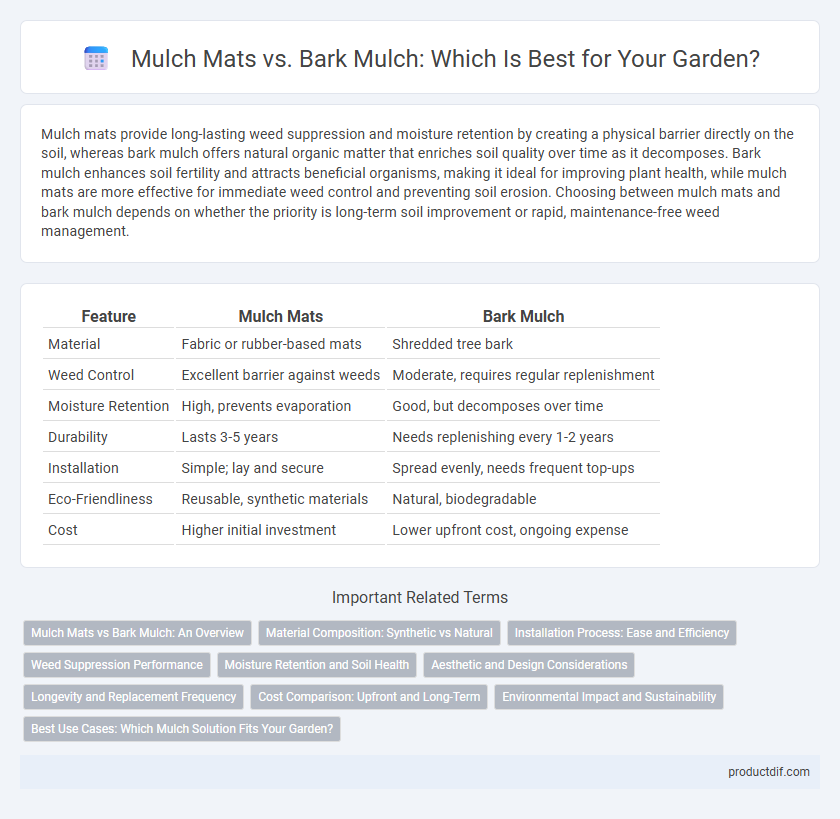Mulch mats provide long-lasting weed suppression and moisture retention by creating a physical barrier directly on the soil, whereas bark mulch offers natural organic matter that enriches soil quality over time as it decomposes. Bark mulch enhances soil fertility and attracts beneficial organisms, making it ideal for improving plant health, while mulch mats are more effective for immediate weed control and preventing soil erosion. Choosing between mulch mats and bark mulch depends on whether the priority is long-term soil improvement or rapid, maintenance-free weed management.
Table of Comparison
| Feature | Mulch Mats | Bark Mulch |
|---|---|---|
| Material | Fabric or rubber-based mats | Shredded tree bark |
| Weed Control | Excellent barrier against weeds | Moderate, requires regular replenishment |
| Moisture Retention | High, prevents evaporation | Good, but decomposes over time |
| Durability | Lasts 3-5 years | Needs replenishing every 1-2 years |
| Installation | Simple; lay and secure | Spread evenly, needs frequent top-ups |
| Eco-Friendliness | Reusable, synthetic materials | Natural, biodegradable |
| Cost | Higher initial investment | Lower upfront cost, ongoing expense |
Mulch Mats vs Bark Mulch: An Overview
Mulch mats provide a durable, reusable ground cover that prevents weed growth and retains soil moisture effectively, making them ideal for long-term garden maintenance. Bark mulch offers natural aesthetics and improves soil health by decomposing over time, supplying organic nutrients and enhancing soil structure. While mulch mats demand a higher upfront investment, they reduce ongoing labor and replacement costs compared to bark mulch, which requires periodic replenishment to maintain its benefits.
Material Composition: Synthetic vs Natural
Mulch mats are typically made from synthetic materials like woven polypropylene or rubber, providing durable weed suppression and moisture retention. Bark mulch consists of natural organic components such as shredded cedar, pine, or hardwood bark, offering nutrient enrichment and improved soil structure as it decomposes. Choosing between synthetic mulch mats and natural bark mulch depends on whether long-term soil health or immediate weed control is the priority in garden maintenance.
Installation Process: Ease and Efficiency
Mulch mats offer a straightforward installation process by simply laying the pre-cut mats directly onto soil, reducing labor time and minimizing soil disturbance. Bark mulch requires manual spreading and even layering, which can be time-consuming and may need periodic replenishing to maintain coverage. Mulch mats provide consistent protection and moisture retention immediately, enhancing efficiency in garden maintenance tasks.
Weed Suppression Performance
Mulch mats provide superior weed suppression by creating a physical barrier that blocks sunlight, preventing weed seed germination more effectively than bark mulch. Bark mulch, while natural and aesthetically pleasing, tends to decompose faster and may allow weeds to penetrate over time. Consistent application of mulch mats can significantly reduce the need for chemical herbicides, promoting healthier garden growth.
Moisture Retention and Soil Health
Mulch mats provide superior moisture retention by creating a barrier that reduces evaporation, promoting consistent soil hydration essential for plant health. Bark mulch decomposes more slowly, enriching soil organic matter and enhancing nutrient availability over time, which improves soil structure and microbial activity. Choosing between mulch mats and bark mulch depends on whether immediate moisture conservation or long-term soil health improvement is the priority for your garden.
Aesthetic and Design Considerations
Mulch mats provide a sleek, uniform appearance with consistent texture, ideal for modern garden designs seeking minimal maintenance and clean lines. Bark mulch offers a natural, rustic aesthetic that enhances traditional and woodland-themed landscapes through varied color tones and organic shapes. Choosing between mulch mats and bark mulch depends on desired garden style, durability requirements, and overall visual impact.
Longevity and Replacement Frequency
Mulch mats offer superior longevity compared to bark mulch, often lasting several years without needing replacement due to their durable fabric construction. Bark mulch typically decomposes within one to two seasons, requiring annual or biannual replenishment to maintain effective ground coverage and soil protection. This extended lifespan makes mulch mats a cost-effective solution for long-term garden maintenance and weed control.
Cost Comparison: Upfront and Long-Term
Mulch mats typically involve a higher upfront cost compared to bark mulch due to materials like biodegradable fabrics or rubber composites, but they offer longer durability and reduced maintenance expenses. Bark mulch generally requires more frequent replacement, increasing long-term costs despite its lower initial price point. Evaluating total investment, mulch mats can provide cost efficiency over several years by minimizing weed growth and moisture loss.
Environmental Impact and Sustainability
Mulch mats reduce soil erosion and water evaporation while minimizing plastic waste compared to synthetic alternatives, promoting sustainable garden practices. Bark mulch, derived from natural tree bark, enhances soil fertility and supports biodiversity by decomposing and enriching the earth, aligning with eco-friendly landscaping goals. Both options contribute to environmental sustainability by improving soil health and conserving moisture, but bark mulch offers a more biodegradable and renewable resource.
Best Use Cases: Which Mulch Solution Fits Your Garden?
Mulch mats provide excellent weed control and moisture retention for smaller garden beds or around young plants, making them ideal for precise landscape management. Bark mulch offers superior aeration and organic matter enrichment, suitable for larger garden areas or trees needing long-term soil improvement. Choosing between mulch mats and bark mulch depends on garden size, plant type, and maintenance preferences for optimal growth and soil health.
Mulch mats vs Bark mulch Infographic

 productdif.com
productdif.com